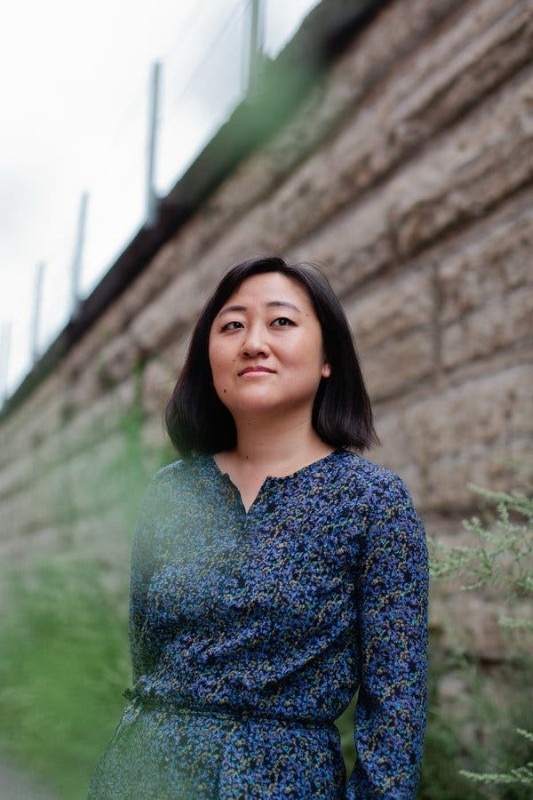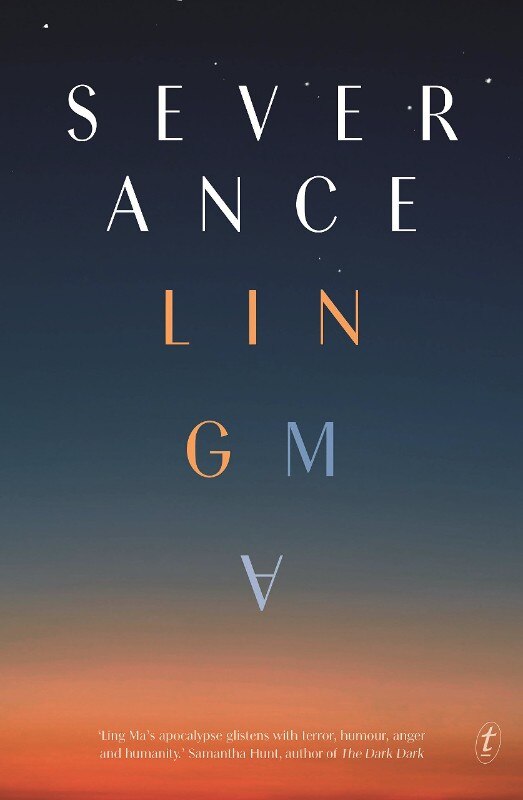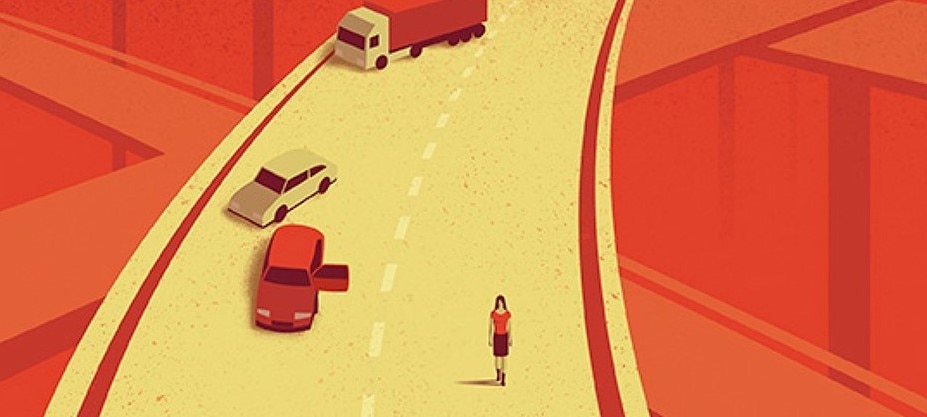Severance (Farrar, Straus and Giroux 2018) is a novel about the life of a young Chinese American woman named Candace Chen, one of the very few survivors of a terrific pandemic which annihilates most of the world’s population, with two different timelines that overlap in a not-chronological narration before and after the contagion. Set in New York, it's also one of the most vibrant stories about a city published in the last few years: before a mysterious virus called Shan Fever decimates the world’s population, Candace is just the typical millennial “work drone”, self-sequestered in her Manhattan office, living a post-contemporary life of chaotic human contacts, with no family, few friends, strange loves; she's also the mysterious author of a photoblog, called Ghost City, which hosts her camera explorations of a less-known NYC, that at some point becomes the last source of information about what’s going on in the city, simply because Candace Chen is one of the only few survivors in New York. Ling Ma, the author of Severance, a Chinese American woman herself, surgically described the life of an entire generation, not just American but global, and its relationship with the urban context, in this innovative pre/post-apocalyptic debut novel, where the post-outbreak scenarios of woods and suburbs serve as a mirror of a forever-lost urban existence. Recently, entertainment news site “for the culturally obsessed” Vulture picked up Severance to praise its lucid prediction of the “slow-burn” quality of the current pandemic, diverging from old and new milestones of the “apocalyptic” genre, such as Cormac McCarthy’s The Road or more recent Station Eleven by Emily St. John Mandell, for its for his ability to describe the agony of mankind: neither of those focused on how slow life can become during an apocalypse, and that’s what’s we’re experiencing in the Coronavirus outbreak.

But this 300-page novel is something more: it describes with incredible accuracy what our life in cities is, our loneliness, and the peculiar sentiments of this start of the millennium. We reached out to Mrs. Ling Ma, who is in Chicago at the moment of the interview, a city where things were “still calm, as it has been hit less hard than other places like New York”, she said. “Everything is closed of course, including the parks and the lakefront beach. We are just staying at home, not even going out for walks anymore”.
Among the protagonists of your
novel Severance are New York City and a pandemic. What’s your sentiment about
NYC being one of the most infected cities in the Coronavirus crisis?
It’s very sad to watch New York undergo this pandemic
in all its severity. There is a strange impulse to be there while the city is
undergoing this crisis. One of my friends lives a few blocks from the Elmhurst
Hospital in Queens. He has been calling the unemployment offices, which is
currently overburdened, while ambulance sirens sound off in the background.
It’s a frightening situation.
We don’t know how cities will
change if they will change when the contagion will be over. But maybe it’s the
way we talk about cities that will change?
I certainly hope this pandemic brings about social
change at large. In the US, hopefully, we find a way towards universal
healthcare. Though your question is about cities, there are more rural places
in the US that will be hit hard by this pandemic, places with inadequate
healthcare access and coverage. I also hope this pandemic spotlights workers’
rights and their lack of access to benefits. Though public memory is short, we
should remember the way certain companies have behaved during this time in
their policies toward their employees.
Photography has a peculiar role in your novel. The protagonist’s photoblog is the last source of information in a city, New York, that is losing its battle with the virus. What’s your relationship with photography?
There are two photographers I’ll name. The first is Vivian Maier, who photographed street life in Chicago and New York during the 1950s and 1960s, often while working a job as a nanny. Her work was discovered posthumously at an estate sale. She did not seem to develop any of her photographs but left the negatives behind. When I see her photographs, I feel both moved and disturbed, especially the ones that contain traces of her presence, whether her reflection in a window or her shadow.
The second is Nan Goldin, who is referenced in the novel. When I first saw her photographs, at age 18 during my first month in college, the scenes depicted felt both shocking and instantly familiar, as if I had encountered them in a dream. I wanted to inhabit them, though I had this feeling that I had inhabited them before.
Perhaps there is a third too. Lastly, my friend Katie Moore had photographed the protests at Zuccotti Park when Occupy Wall Street was happening in 2011. She would work her day job, then go down to the park at night to take pictures. Later, she joined many of the protests in the following years. I liked seeing her pictures and hearing her stories.
I appreciated many things in Severance, maybe the on I loved the most is the subtle description of human relationships. As a writer, as an observer of humans, did you catch any shift in them during these quarantine days? Did you imagine how they could evolve?
Thank you. Because this time of quarantine feels suspended from our usual daily routines, we are doing things we wouldn’t ordinarily do, things we wouldn’t normally have the time to do. In my household, we have found ourselves getting in touch with people from the past, whether speaking to them on the phone or over Zoom more frequently. Also, there is some nostalgia. I have been listening to bands from high school and college years. As I’m typing this, I am listening to Built to Spill’s Live album, from 2000, which I used to play while doing math problem sets for school. Because we are functioning in a realm outside of normalcy, there has been a dreamy quality to our days. I’ve been lucky, as my health has not suffered. My friends and family are still fine, even though some work in the hospital. No one has lost their job yet. However, everyone I know feels a vague sense of hovering doom.
You’re American, born in China. Here in Europe, even in Milan, racial acts happened when the virus hit Wuhan. Chinese restaurants, which are so popular here, were avoided. What’s the situation in the US? Had you any chance of fearing people even more than the virus?
I’ve heard about racist encounters from friends. I think Cathy Park Hong captures this sense of unease and anger very well in her recent essay in the NY Times, while also chronicling some recent anti-Asian incidents during the pandemic. She speaks of the particular type of racism in her essay collection Minor Feelings, which I found very illuminating.
At the moment, I’m not as afraid as I could be. The façade of Midwestern politeness has not yet slipped. If conditions in Chicago were to worsen, that may change. I grew up in places that were not very diverse, like Utah and Kansas. Though I learned to distinguish between racism and curiosity, discrimination was always a fact of existence. I don’t forget that the first US law restricting immigration was the Chinese Exclusion Act in 1882.

I’ve read that you were inspired by Romero’s zombie flicks and Frank Darabont’s TV series The Walking Dead. Would you rewatch them in these days? I admit that reading Severance during the lockdown was a sublime experience...
Most apocalyptic movies or TV shows have not captured the unique nature of this particular catastrophe. The surprise is that, for many of us, our day-to-day lives have become more banal, more boring. There seem to be two extremes. On the one hand, there are the high death tolls and the overtaxed hospitals. On the other hand, there is the benign insularity of working from home. It is difficult to calibrate between such extremes.
Retracting from social life, the impression is that many people are finding out about works of culture they didn’t know about, reading books, following all kind of live debates on IG… Do you think that this is a chance to bring culture back to a pivotal role in our world?
Not to sound pessimistic, but I think algorithms exert more control over our lives than we care to admit, directing us to which TV shows we binge on, which books we download next, what music we stream. There are decisionmakers who direct us to those fleeting entertainments — and it’s usually the latest consumer offering that they want to monetize. To find the work that really speaks to you, you have to find ways to seek it out yourself.
Is there any particular aspect of this crisis which made you think, “well, reality surpassed imagination this time”? For example,here in Italy tape stripes on the ground near to the entrances of restaurants define the distance that delivery workers have to maintain one from each other, and the same near the counters in supermarkets…
Reality always surpasses fiction. I’ve always thought this. But during this time, what has surprised many of us is how closely reality seems to adhere to catastrophe movies or some cultural detritus we’ve seen before. The photos of empty New York look like they came from an apocalyptic film we only somewhat remember, but have definitely seen before. The exaggerations that we thought could only occur in fiction — like American leaders advocating the idea that human lives must serve as blood sacrifices for the economy — are actually happening. That reality seems to imitate fiction so faithfully is what surprises us the most.
Opening image: Davide Bonazzi, from the Italian edition of “Febbre”




